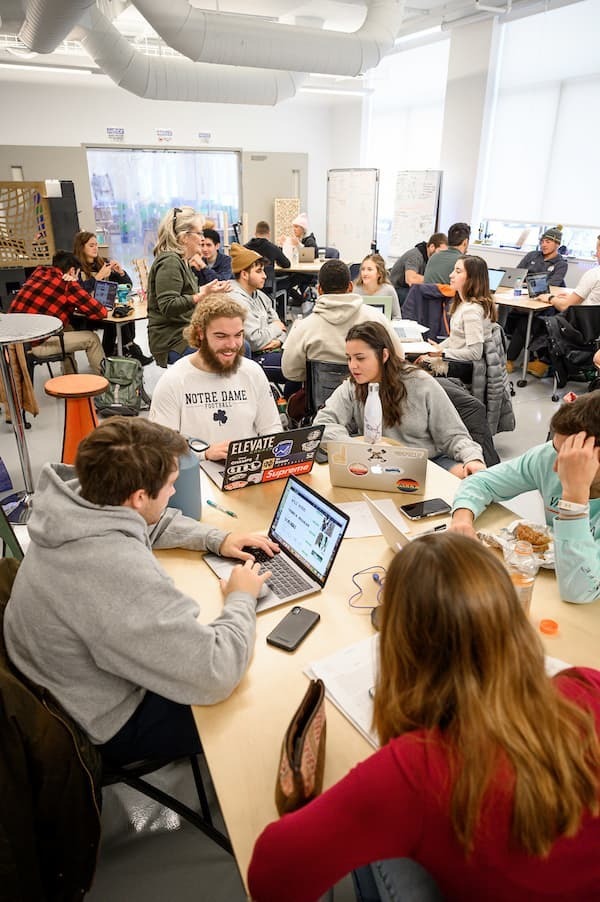Courses

The Sheedy Family Program curriculum consists of three required courses. Students accepted into the program are required to complete all three. The series is designed to help students connect their interests in business and the liberal arts and to discern their visions of a meaningful life or career.
Sheedy students may opt to enroll in additional courses, exclusive to the program, that are focused on professional development. Please consult ND Class Search or talk with the program directors to learn about optional courses offered any given semester.
Required course sequence
1. ALSF 30126: Business in Context (3 credits)
For their first course, Sheedy students take a program-specific gateway seminar designed to introduce them to some of the biggest questions and most important debates in business. "Business in Context" focuses on scholarship in the humanities, with an eye toward application in the contemporary practice of business.
Unless studying abroad, students admitted to the Sheedy Family Program take this course during their first (fall) semester in the program.
Students taking "Business in Context" also enroll concurrently in ALSF 33126: Sheedy Program Enrichment Experiences, a 1-credit course that covers or marks their participation in all required Sheedy programming, including the monthly Sheedy Dinners and annual fall retreat.
2. The Working Life
In their second Sheedy course, students take on practical, personally relevant questions about what makes work meaningful and how work fits within a purpose-driven life. For the sake of community building and curriculum continuity, students should plan to take the second Sheedy course the spring semester immediately after they finish "Business in Context." Sheedy students have a couple of options for fulfilling this requirement:
ALSF 20255: Work, Meaning, and Happiness (3 credits)
Work plays a deeply important role in our lives. Finding good work – which, for many of us, means getting a meaningful job you’re passionate about – can seem like the crucial factor in determining whether your life goes well or poorly, and whether you end up happy and fulfilled or miserable and empty. But things aren’t nearly so simple. What kind of work is available to anyone in particular is largely determined by factors outside of our control. And when it comes to work, we’re notoriously bad at predicting what aspects of a job we’ll find meaningful and fulfilling, and which will drain us of life and energy. In this course, we will focus on the most urgent questions facing anyone trying to discern what their life’s work will be. This course fulfills the University's second Philosophy requirement and is taught by Prof. Paul Blaschko.
ALSF 20247: Women's Work (3 credits)
In this course, we’ll explore 'women’s work' in three senses of the phrase. First, we’ll consider the history of gendered "separate spheres" in the United States, the way in which some kinds of labor – care work, teaching, and domestic chores, for example – came to be seen as properly the concern of women, while other kinds of work, like business careers and scholarly pursuits, became coded masculine. Second, we’ll understand ‘work’ in the sense of a work of literature: we’ll read popular novels by and about working women and probe how their fictional representations offer insights into lived realities. Finally, we’ll take ‘women’s work’ as the starting place for purpose-driven career discernment that has gender as a key variable. We’ll interview and interact with ND alumni to probe how 21st century women are overcoming barriers in the workplace, finding meaning in their work, and navigating pressures to ‘have it all.’ We’ll approach stories – literary and personal – as a form of data and use that data collaboratively to interrogate the gendered working life. This course is being designed to fulfill the University’s literature requirement and is taught by Prof. Chris Hedlin.
Want to take both? Either of these courses could also count toward your third Sheedy requirement.
Note: Sheedy students in the 2022-23 and 2023-24 cohorts may take THEO 20639 “Theology, Ethics, and Business” or BES 20702 "Honors Theology, Ethics, and Business” to fulfill the second Sheedy requirement. For all subsequent cohorts, these courses count toward the third, elective course requirement instead.
3. Business and the Liberal Arts Elective (3 credits)
For their third required course, Sheedy students get to select an upper-level course that takes up a "big question" about business, work, or the economy within a specialized discipline. They may take this course any time during their time in the Sheedy Family Program, or even before. (Students can count courses retroactively.)
Here is a list of approved courses. The document indicates which courses are being offered next semester and also contains a "featured" section, which highlights courses taught by Sheedy-affiliated faculty that come recommended by Sheedy students.
Some sample recommended courses include:
- Business in America from East India Company to Google (Joshua Specht, History)
- Christianity, Commerce, and Consumerism (Brad Gregory, History)
- Consuming America (Emily Remus, History)
- Capitalism and Its Discontents (Joshua Lund, Romance Languages and Literatures)
- Gender @ Work in US History (Dan Graff, Higgins Labor Program)
- The History of American Capitalism (Korey Garibaldi, American Studies)
- Philanthropy and the Common Good (Jon Hannah, Political Science)
Studying abroad? Taking a course that you believe is in keeping with the goals of the Sheedy Family Program but isn't on the list? We want to work with you. To propose a course to count for the third SFP requirement, please contact the SFP directors, Paul Blaschko (pblascko@nd.edu) and Chris Hedlin (chedlin3@nd.edu). Please include the course title, catalog description, and a syllabus, if possible, in your proposal. To be considered, a course must be 3 credits and firmly satisfy all three of the following criteria:
- Relates to the economy, business, enterprise, labor and/or work.
- Draws upon readings and methodologies (e.g., dialogue, textual analysis) from the humanities or social sciences
- Engages one or more “big questions” or complex social issues.